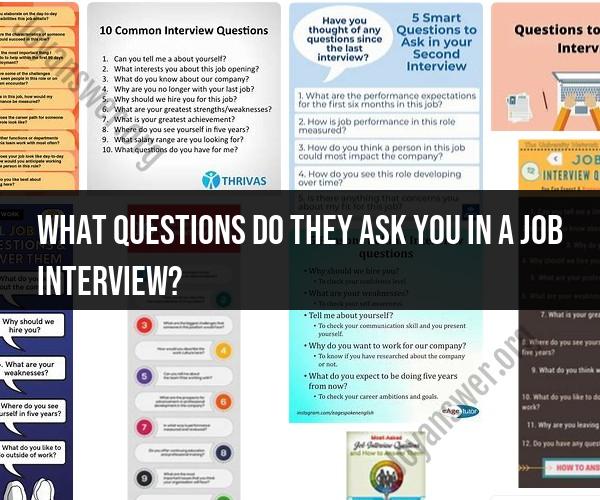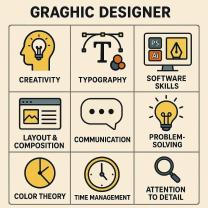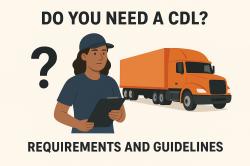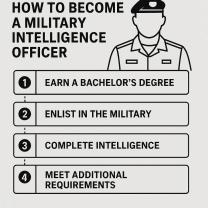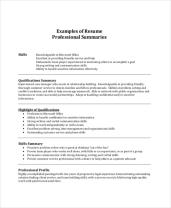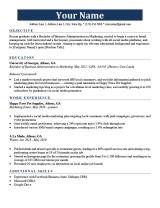What questions do they ask you in a job interview?
During a job interview, you can expect a range of questions designed to assess your qualifications, experience, personality, and fit for the position and company. Here are some common job interview questions you might encounter:
Tell me about yourself.
- This is often an opening question, allowing you to provide a brief overview of your background and experience.
What interests you about this role and our company?
- The interviewer wants to know your motivations and how well you understand the company and its values.
What are your strengths and weaknesses?
- Be prepared to discuss your key strengths and demonstrate self-awareness by addressing your weaknesses.
Can you describe your previous work experience?
- Walk through your work history, highlighting relevant accomplishments and experiences.
Why did you leave your previous job?
- Be honest and tactful in your response. Focus on career growth and opportunities.
What do you know about our products/services?
- This tests your research on the company. Ensure you're informed about their offerings.
How would you handle a challenging situation or conflict with a coworker?
- Provide a specific example and discuss how you resolved the issue diplomatically.
Where do you see yourself in 5/10 years?
- Describe your career goals and how they align with the potential for growth at the company.
What relevant skills and qualifications do you bring to this role?
- Relate your skills and experience to the job requirements.
Can you describe a significant achievement in your previous role?
- Offer a detailed account of a past accomplishment that demonstrates your abilities.
How do you handle pressure or tight deadlines?
- Discuss your ability to manage stress and stay organized.
Tell me about a time you worked in a team.
- Provide an example of a successful team project and your role in it.
What do you like to do outside of work?
- This question aims to understand your interests and character.
Why should we hire you?
- Summarize your unique qualifications and how they meet the company's needs.
Do you have any questions for us?
- Always have questions prepared to show your interest and engagement. Ask about the role, company culture, or team dynamics.
Remember to tailor your responses to the specific job and company. It's also helpful to practice your answers and conduct research about the company beforehand. Additionally, be ready for behavioral interview questions that ask for specific examples of how you've handled situations in the past. These questions often follow a format like "Tell me about a time when..." and are used to assess your behavior and problem-solving skills.
Common Job Interview Questions and How to Answer Them
Here are some common job interview questions and how to answer them:
- Tell me about yourself. This is your chance to give the interviewer a brief overview of your skills, experience, and why you're interested in the job. Be sure to focus on the most relevant aspects of your background and tailor your answer to the specific job you're interviewing for.
- Why are you interested in this position? This question shows the interviewer that you've done your research on the company and the role. Be specific about what interests you about the job and how it aligns with your career goals.
- What are your strengths and weaknesses? When answering this question, be honest and authentic. Focus on your strengths and how they would be relevant to the job. For your weaknesses, choose one or two that you're working on improving and explain how you're doing so.
- Where do you see yourself in five years? This question helps the interviewer understand your career goals and how they align with the company's. Be specific about your aspirations and how you plan to achieve them.
Behavioral Questions in Job Interviews
Behavioral interview questions are designed to assess your soft skills, such as communication, teamwork, and problem-solving. These questions typically start with "Tell me about a time when..." and ask you to describe a specific situation where you demonstrated the skill in question.
For example, an interviewer might ask: "Tell me about a time when you had to deal with a difficult customer." To answer this question, you would describe a specific situation where you had to deal with a difficult customer, what you did to resolve the situation, and the outcome.
Preparing for Technical and Skills-Based Interview Questions
Technical and skills-based interview questions are designed to assess your knowledge and abilities related to the specific job you're interviewing for. These questions can vary depending on the industry and the role, but they typically involve asking you specific questions about your skills and experience.
For example, if you're interviewing for a software engineering job, you might be asked questions about your programming skills, experience with specific programming languages, and knowledge of software development methodologies.
To prepare for technical and skills-based interview questions, it's important to review the job description carefully and make sure you're familiar with the skills and experience that the employer is looking for. You should also practice answering common interview questions.
Asking Questions in the Job Interview: What to Inquire About
At the end of the interview, you will typically have the opportunity to ask the interviewer questions. This is your chance to learn more about the company, the role, and the culture. It's also a good opportunity to show the interviewer that you're interested in the job and that you've done your research.
Here are some good questions to ask in a job interview:
- What are the biggest challenges facing the team/department right now?
- What are the opportunities for growth and development in this role?
- What is the company culture like?
- What is your favorite thing about working here?
Handling Unexpected or Challenging Interview Questions
Sometimes, interviewers may ask you unexpected or challenging questions. The best way to handle these questions is to stay calm and collected. Take a moment to think about your answer before you respond. If you're not sure how to answer a question, it's okay to say so. You can also ask the interviewer for clarification.
Here are some tips for handling unexpected or challenging interview questions:
- Stay calm and collected.
- Take a moment to think about your answer before you respond.
- If you're not sure how to answer a question, it's okay to say so.
- You can also ask the interviewer for clarification.
- Be honest and authentic in your answers.
- Avoid making excuses or blaming others.
- Focus on your strengths and how you can contribute to the company.
By following these tips, you can increase your chances of success in your next job interview.
